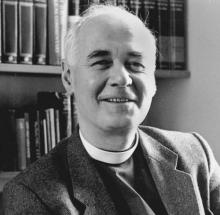The Reverend Dr. John Polkinghorne was born in Weston-super-Mare, England on 16 October 1930. He began his studies in science, specifically physics. He earned both an M.A. and a Ph.D. at Trinity College, Cambridge, where he was elected a fellow in 1954 and studied under Paul Dirac, focusing on particle physics. In 1956 he was appointed Lecturer in Mathematical Physics at the University of Edinburgh and returned to Cambridge as Lecturer two years later. Polkinghore was promoted to professor in 1968.
Polkinghorne’s career changed when in 1979 he resigned as Professor of Mathematical Physics at the University of Cambridge to pursue theological studies. After training at Westcott House, in Cambridge, he became a priest in the Church of England in 1982. Polkinghorne served two years as a parish priest in Bristol and then worked as a vicar in Kent, before he returned to academia in 1986 to become Dean of Trinity Hall, Cambridge. He was then named President of Queens' College in Cambridge from 1989, until he retired in 1996. He is currently a Fellow (and former President) of Queens’ College, Cambridge and a Canon Theologian of Liverpool Cathedral. He and wife Ruth have three children.
Polkinghorne’s distinguished accomplishments include being elected Fellow of the Royal Society (FRS) in 1974 and Knight Commander of the Order of the British Empire (KBE) in 1997. He was awarded the Templeton Prize for Science and Religion (2002) and was awarded a von Humboldt Foundation Award (1999). Polkinghorne is the founding president of the International Society for Science and Religion and he is one of the founders of the Society of Ordained Scientists.
Polkinghorne’s first publication, The Analytic S-Matrix (1966 jointly with R. J. Eden, P. V. Landshoff and D. I. Olive), dealt with physics. Later he wrote Models of High Energy Processes (1980); The Particle Play (1979); The Quantum World (1984); Rochester Roundabout (1989); Beyond Science: The Wider Human Context (1996); and Quantum Theory, A Very Short Introduction (2002).
Polkinghorne is internationally recognised for his contribution to the study of theology and science, and he has published several books that combine his two areas of expertise: theological inquiry and scientific investigation. These books include: The Way the World Is: The Christian Perspective of a Scientist (1984); One World—The Interaction of Science and Theology (1986); Science and Creation (1988); Science and Providence (1989); Reason and Reality (1991); The Faith of a Physicist (1994); Quarks, Chaos and Christianity (1994); Serious Talk: Science and Religion in Dialogue (1995); Beyond Science (1996); Scientists as Theologians (1996); Belief in God in an Age of Science (1998); Science & Theology: An Introduction (1998); Guide to Genesis, with John Hargreaves (1999); The End of the World and the Ends of God: Science and Theology on Eschatology (2000); The Work of Love: Creation as Kenosis (2001); Faith, Science and Understanding (2001); Faith in the Living God: A Dialogue–with Michael Welker (2001); The God of Hope and the End of the World (2003); Science and the Trinity: The Christian Encounter with Reality (2004); and Living with Hope: A Scientist Looks at Advent, Christmas and Epiphany (2004).



